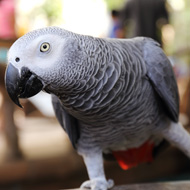Parrot and songbird brains 'contain more neurons than primates'

In parrots, brain mass varied from 1.15-20.73g, while the numbers of brain neurons ranged from 227 million to 3.14 billion.
New research may be able to explain how corvids and parrots can rival the cognitive abilities of great apes, despite the small size of their brains.
Scientists say the brains of songbirds and parrots contain on average twice as many neurons as primate brains of the same mass.
Their findings have been published in the Proceedings of the National Academy of Sciences.
Traditionally, smaller brains are expected to have a lesser capacity to process information. Therefore the level of cognition seen in corvids and some parrots is puzzling - they can manufacture and use tools, solve problems insightfully, recognise themselves in a mirror and plan for their future needs, among other impressive abilities. They also share the rare capacity for vocal learning with humans.
Led by the Charles University in Prague, researchers studied the cellular composition of 28 bird species, including 11 parrot species, 13 vocal learning songbird species and four additional model species.
Among the songbirds, brain mass ranged from 0.36-14.13g and the total number of neurons in the brain ranged from 136 million to 2.17 billion.
In parrots, brain mass varied from 1.15-20.73g, while the numbers of brain neurons ranged from 227 million to 3.14 billion.
Corvids and parrots had much higher proportions of brain neurons in the pallial telencephalon than primates and other mammals or birds. Large-brained birds therefore have forebrain neuron counts that are equal to or greater than primates with much larger brains, the researchers wrote.



 The latest
The latest